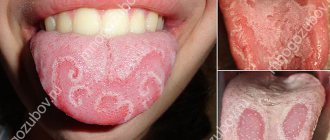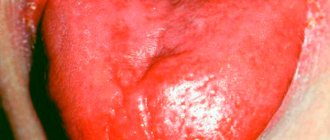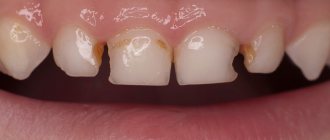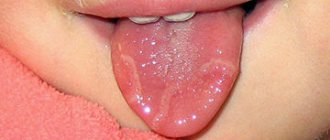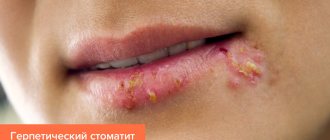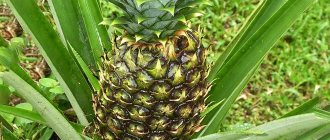Concept
Geographical language in a child - photo :
Geographical language - what does it mean? Doctors define geographic tongue as a disease that affects the mucous membrane of the tongue . The process is inflammatory and develops quite quickly.
Characterized by peeling of the tongue. The lesions are red in color and have borders that appear as white epithelium.
At first, the baby does not feel anything special, but over time, itching occurs in the tongue area.
Causes
The disease does not appear by chance. Its occurrence is facilitated by:
- Disorders of the digestive system . This happens due to poor nutrition and poisoning.
- Desquamative glossitis . Happens in infants during teething. In this case, the disease is not dangerous and goes away naturally.
- Age-related changes in girls. Shortly before or during the first menstruation, a geographic tongue appears.
- Anemia. If a child's hemoglobin level has dropped significantly, it is quite possible that this will show up on the tongue.
- Infections . Often accompanied by the appearance of a geographical language.
- Lack of vitamins . With vitamin deficiency, the child’s tongue is often affected by this pathology.
- Disturbances in the functioning of the endocrine system . They negatively affect the entire body, including the tongue.
- Heredity . If one of the parents has ever had such a disease, there is a high probability that the child will also develop it.
Read about how to treat balanoposthitis in a child here.
Geographical language: what to do if you are faced with desquamative glossitis?
The term “geographic tongue” or “desquamative glossitis” refers to inflammation of the mucous membrane of the tongue, accompanied by sloughing (desquamation) of the epithelium, as a result of which the surface of the tongue becomes covered with bright pink spots with a white rim. The spots are flat, have rounded, distorted outlines, which makes the tongue look like a geographical map. The sites of inflammation are mainly the lateral surfaces and the back of the tongue. Causes Desquamative glossitis is a relatively common disease, although the clear causes of its occurrence have not been fully identified. It is generally accepted that geographic tongue is the body’s response to internal diseases, most often from the digestive and circulatory systems. Other common factors influencing the appearance of desquamative glossitis include:
- heredity;
- oral diseases;
- acute infectious diseases;
- avitaminosis (lack of vitamins);
- puberty in a child;
- exudative diathesis;
- violation of the metabolism of B vitamins;
- autoimmune diseases (disorders of the human immune system);
- endocrine, hormonal changes in the body (pregnancy, menopause, menstruation);
- teething in children.
Symptoms At the beginning of the inflammatory process, grayish-white spots with a diameter of several millimeters appear on the tongue. The papillae in the center of these spots gradually peel off, forming a bright pink or reddish round area. The desquamation (desquamation) zone can be either single or multiple, and can change shape and location. As a rule, geographic tongue occurs without any individual sensations, and therefore is detected by chance as a result of examination of the oral cavity. Sometimes patients experience itching, tingling, changes in the sensitivity and taste of the tongue, which may be due to poor oral hygiene or consumption of irritating foods. Diagnosis Geographic tongue is most often a symptom of serious illnesses, therefore, when it appears, it is necessary to diagnose the gastrointestinal tract, circulatory system, as well as diseases that may be the root cause of desquamative glossitis. It is mandatory to prescribe a general analysis of urine and feces and collect anamnesis (information about previous diseases, living conditions of the patient, etc.). Sometimes geographic tongue develops in children during teething or during puberty in girls. In these cases, no diagnosis is made. Treatment If the patient does not experience pain or discomfort, then no special treatment is prescribed: the geographic tongue will go away on its own after eliminating the root cause of the disease. If you experience a burning sensation, pain or dry mouth, the following is recommended:
- carry out thorough sanitation of the oral cavity;
- exclude excessively spicy, salty, cold or hot foods from the diet;
- rinse your mouth with a decoction of sage, chamomile or St. John's wort;
- give up cigarettes and alcohol for a while;
- apply rosehip oil to the oral mucosa (contains beta-carotene, vitamins A, E, B3)
Prevention This disease requires several preventive measures:
- careful oral care;
- timely diagnosis of somatic diseases;
- Prevention of vitamin deficiency: try to diversify your diet with foods rich in B vitamins.
It is important to remember that desquamative glossitis is a symptom of other very serious diseases, so a person who discovers a geographic tongue should immediately consult a specialist.
Symptoms and clinical picture
The disease has pronounced symptoms:
- burning and itching . The tongue itches and there is a tingling sensation. This is especially felt during meals;
- unusual drawings in the language that really look like a map. Drawings can be bright or faint;
- bright red spots on the tongue. May be of different sizes. The spots are smooth to the touch;
- the tongue increases slightly in size. Swelling is observed ;
- discomfort while speaking. The person feels pain and tingling . He has difficulty pronouncing words;
- weakness . The person becomes lethargic and drowsy.
If the disease is in the later stages, the child's condition will worsen. He will become lethargic, his appetite will disappear, and the burning and tingling sensation of his tongue will intensify.
What does it represent?
The more common name for desquamative glossitis - “geographic tongue” - appeared and came into use due to its most characteristic manifestations - the appearance of foci of inflammation on the tongue, which are bordered by white exfoliating epithelium.
Because of this, the appearance of the language begins to resemble a three-dimensional geographical map. Areas of exfoliation and inflammation can appear in a completely random order, both on the back of the tongue and on its lateral surfaces
.
Course of the disease
Photo: what a geographic tongue looks like
The process of desquamation of the epithelium (epithelium is the upper layer of all surfaces of the body, as well as mucous membranes and organs) can last for varying periods of time - from several days to several months. Sometimes even longer.
Usually the little patient does not experience strong discomfort
. However, those areas that are practically unprotected due to the fact that the top layer is exfoliated are highly susceptible to all kinds of infections. If infection occurs, the child’s tongue may become covered with cracks, which lead to quite painful sensations.
What sensations does the child experience?
In the first stages, the disease does not manifest itself. The child may not feel sick.
Only in the later stages are burning and itching felt, which rapidly intensify . There is a tingling sensation on the tongue during and after eating.
Swelling of the tongue makes it difficult for the child to speak . Discomfort during a conversation increases greatly. If the disease is not treated, severe weakness will occur. The child will feel tired and drowsy.
Symptoms
Most often, neither the children themselves nor the parents notice either the onset of the disease or its course until a certain time. Identification occurs in most cases completely by accident - at a dentist’s appointment or an examination of the oral cavity by a general practitioner.
Sometimes older children can notice the problem on their own, for example, during daily oral hygiene procedures or by carefully looking at the tongue in the mirror.
Do you know when to start brushing your child’s teeth? The answer can be found in our article.
We will tell you in detail why a black coating occurs on the tongue in children.
At this address: https://www.vash-dentist.ru/detskaya-stomatologia/polost-rta/tantum-verde-dlya-detey-instruktsiya-po-primeneniyu.html - you will find instructions for using the drug Tantum Verde.
Main symptoms
- the appearance of areas of white-gray clouding of the surface of the tongue;
- swelling and then desquamation of the affected areas of the epithelium;
- the appearance of red or bright pink spots that have different sizes and shapes;
In those areas where desquamation occurs, the mushroom-shaped papillae of the tongue become very visible. They look like bright red dots. Quite rarely, areas of desquamation appear alone. Most often these are numerous lesions on different parts of the tongue.
Possible manifestations
- increased sensitivity of the surface of the tongue;
- burning sensation;
- itching;
- numbness;
- tingling;
- change in sensitivity;
- changes in the perception of taste;
- increase in size due to multiple foci of inflammation and desquamation;
- discomfort during a conversation;
- difficulty swallowing and chewing food;
- headache;
- enlargement of nearby lymph nodes;
- general deterioration of health.
Children often feel very anxious about the appearance of their tongue. This leads to stress, and stress can lead to a significant worsening of the disease. If the process worsens, the strength and speed of desquamation also increases
.
In almost half of the cases this leads to a manifestation such as a folded tongue
– the general shape changes, folds appear on the surface due to multiple foci of desquamation.
Diagnostics
Performed in a hospital. To diagnose the disease, the child is examined by a doctor, then blood, urine and stool tests .
Laboratory tests help not only diagnose the disease, but also determine the cause of its occurrence. Usually, after the first visit to the hospital, it is possible to make a diagnosis and prescribe the optimal treatment method.
How to treat plantar warts in children? Find out about this from our article.
Complications and consequences
If the disease is not treated, complications may occur:
- Scratches and sores on the tongue. A very unpleasant phenomenon that brings pain.
- Weakness . The child may become lethargic and pale. He will not be able to concentrate during lessons, which will negatively affect his grades at school.
- Irritability , moodiness. Due to a burning sensation in the mouth, the baby will become restless, begin to cry often and be capricious. This will negatively affect the functioning of the nervous system.
- Problems with digestion and endocrine system. Geographic language can signal these problems. If you do not pay attention to this, the functioning of the digestive organs will deteriorate and lead to serious illnesses.
Negative consequences also include possible damage to the tissues of the tongue. Due to severe itching, the child may scratch his tongue, cracks and wounds will appear, which are very difficult to cure .
Pathogenic bacteria and viruses can get into the resulting holes in the tongue, which will lead to serious diseases of the oral cavity.
Treatment methods
You can cure a child in various ways. Pharmacy and folk remedies will help you recover.
Medication
If a geographic tongue appears, specialists prescribe:
- rinse the mouth with a solution of 1% citral . Mix 25 drops of solution and 100 g of warm boiled water. The resulting medicine is used to rinse the mouth in the morning and evening for five days. The product relieves burning and itching, eliminates swelling. Discomfort in the oral cavity disappears;
- Vitamin E oil solution . Sold in a pharmacy. The product is applied to a cotton pad and applied to the tongue for ten minutes, then the medicine is removed. The procedure is carried out twice a day;
- analgin . Prescribed for severe pain. You need to take it one tablet if necessary, but no more than three tablets per day;
- taking vitamins . You need to take vitamin complexes, or vitamins B and E separately, two capsules a day;
- calcium pantothenate . The drug is taken one tablet twice a day. The medicine fights the disease and eliminates unpleasant symptoms.
The duration of taking the drug is two weeks. Usually this time is enough to eliminate the disease. It goes away as suddenly as it appears.
Folk remedies
It is recommended to rinse the mouth with herbal solutions. To do this, mix one tablespoon of St. John's wort and a glass of boiling water. The medicine is infused for an hour, then filtered. You should rinse your mouth with the prepared solution at least four times a day.
chamomile to treat oral cavity . To do this, mix two teaspoons of herbs and a glass of boiling water.
The medicine must be infused for thirty minutes, then strained and cooled. Rinse the mouth with the prepared product three times a day.
Apply fresh carrot juice to the tongue three times a day. If you don't have carrots, you can use fresh potato juice.
Propolis is used to treat the tongue . They lubricate the affected area three times a day. Recovery will begin quickly, the child will get better.
Recommendations for the treatment of varicocele in adolescents can be found on our website.
Treatment
It is impossible to describe one treatment option, since the measures taken in a particular case are entirely individual. This happens due to a huge number of possible reasons.
If the disease was caused by any general disease, then, first of all, it should be treated. Since without eliminating the cause, local treatment of geographic tongue is useless.
However, there are a number of therapeutic measures that should be carried out in any case, regardless of what caused the occurrence of desquamative glossitis.
- Sanitation of the oral cavity - identification and treatment of caries (for baby teeth this is as important as for permanent teeth), removal of plaque and all kinds of deposits, regular cleaning of the entire oral cavity using professional methods, as well as careful self-hygiene.
- To maintain internal balance and enhance the body's protective properties, it is recommended to take multivitamin complexes.
- After the first symptoms appear, alkaline rinses are desirable.
- If itching, pain, burning or other unpleasant symptoms occur, you can use analgesic (painkiller) applications of various drugs on the affected surface of the mucosa.
- Antiseptic rinses.
- Therapy that reduces the body's allergic activity and its manifestations.
You should not neglect seeing a doctor and treating geographic tongue, even if this disease does not manifest itself in any way, except for exclusively external, visible symptoms.
Diagnosis by a specialist is extremely important, since this disease can be an indicator of other, more serious and dangerous ones that require mandatory medical examination and treatment.
Home treatments
Traditional medicine also has some methods and recipes used for desquamative glossitis. Almost all of them are aimed at alleviating discomfort and getting rid of external symptoms.
- Rinse
. Add 2-3 drops of iodine and half a small spoon of soda to a glass of warm water - you should rinse your mouth with this solution twice a day, after brushing your teeth. Pure vegetable oil, sterilized in a water bath (the duration should be at least half an hour), after cooling, can also be used for rinsing.The duration of this procedure should be at least 2 minutes. Rinsing with decoctions of herbs that have an antiseptic effect - chamomile, St. John's wort, sage and others.
- Lotions
made from gauze napkins, pre-moistened with oils (vaseline or peach), fish oil. Apply gauze for 3-5 minutes. - Special oral baths
. To do this, you need to take sunflower oil (or other vegetable oil) boiled for 20 minutes in a water bath and cool it. After cooling completely, a small amount (1.5–2 tablespoons) is taken into the mouth for 5–10 minutes and then spat out.
If you find an error, please select a piece of text and press Ctrl+Enter.
Tags: geographic language for children language
Did you like the article? stay tuned
Previous article
When can you start brushing your child’s teeth?
Next article
Oral irrigator Aquajet (Akvadzhet)
What does Dr. Komarovsky advise?
To cure your child faster, it is recommended to follow the doctor’s advice:
- Do not scratch or injure your tongue. During the treatment period, food should be soft , not hard. Spicy and too hot dishes are prohibited.
- The child should be prohibited from scratching his tongue. This can lead to wounds and complications.
- It is imperative to show the child to the doctor. Geographic language always signals larger problems .
- It is recommended to give the child vitamins or vitamin complexes. It is quite possible that the child has vitamin deficiency. This method will help restore the child's health.
- There is no need to rush to give your child serious medications . Usually vitamins and various lotions help to heal. Recovery occurs within two weeks.
Prevention
To prevent the occurrence of the disease, you must follow some rules:
- You need to eat healthy food . The child should not be given too hard food, as it can injure the tongue.
- The child is regularly given vitamins . This increases his immunity, improves the functioning of various body systems.
- The baby should be shown to a doctor to monitor his health and, in case of illness, begin treatment immediately.
- It is necessary to accustom the baby to regular and proper oral hygiene . The child should brush his teeth every day, morning and evening.
- Spicy, junk food is excluded. It can negatively affect digestion and lead to geographic tongue as a complication.
Thus, this disease is accompanied by unpleasant symptoms, pain and discomfort. To cure a child, it is necessary to diagnose the disease and begin treatment immediately.
Read about the symptoms and treatment of chickenpox in children here.
You can learn about the causes
Write a comment
Svetlana
March 16, 2015 at 6:49 am
The cause of geographic tongue can indeed be several diseases. But mainly this is a problem of the gastric tract. And first of all, such an unpleasant disease as gastroesophageal reflux. This is when the contents of the stomach are thrown back into the esophagus and even the oral cavity. This can be complicated in addition bile reflux, when bile from the duodenum is thrown into the stomach and esophagus. So you should definitely contact a gastroenterologist, because if the disease becomes chronic, then it’s just torment, as it is accompanied by constant heartburn and burning in the esophagus and oral cavity. So that the most important thing is to start treating it right away; for this, the doctor will prescribe medications and a strict diet. So you should always monitor the child’s tongue.
Tatiana
May 30, 2015 at 11:04 am
In addition to rinsing with soda, chlorgrexidine lotions also help. In my case, this disease is caused by stress and manifests itself when the body is weakened - nervous overstrain or a cold.
Nadia
January 1, 2016 at 10:04 pm
Hello! My son is 3 years old. He has a geographic tongue. Our doctor always tells me to just rinse when I come. Spots appear periodically, and recently I began to notice that with the appearance of spots on my son’s tongue, his bowel movements are disturbed. But there are no complaints from him arrived.
Olga
August 28, 2016 at 6:15 pm
My son’s geographic tongue was noticed by a dentist during an appointment. I had never even heard of this before, and I didn’t know that, to be honest, there are different languages. Nothing bothered my son, there were no complaints. The dentist said that there is nothing wrong, the main thing is to find out the reason. Perhaps it’s untreated teeth, or a lack of vitamin B. We fixed all the teeth, and after a while I noticed that my son’s tongue became even.
Irina
September 4, 2016 at 12:19 pm
My sister also had a similar experience in childhood, but they did nothing, they didn’t even pay attention to this fact. As she grew older, everything disappeared; now her language is normal, like all other children. Therefore, I am inclined to conclude that with age, geographic tongue goes away on its own without any treatment. So there’s nothing to be afraid of, at least it’s passed for us.
Nata
February 8, 2022 at 0:02
My youngest had this condition of his tongue a couple of years ago, I noticed it by chance when I was brushing my teeth, but not as bad as in the pictures, there were smaller marks. I didn’t immediately understand what was wrong, I thought it was burned with something like acid, especially since before that I had complained a little about my stomach. We rushed to the doctor, it turned out to be worms, we were treated and everything went away, the tongue returned to normal. But the doctor also explained to me that such symptoms occur for various reasons, so if suddenly this appears on a child’s tongue, you don’t need to wait until it goes away on its own, but immediately consult a doctor.
